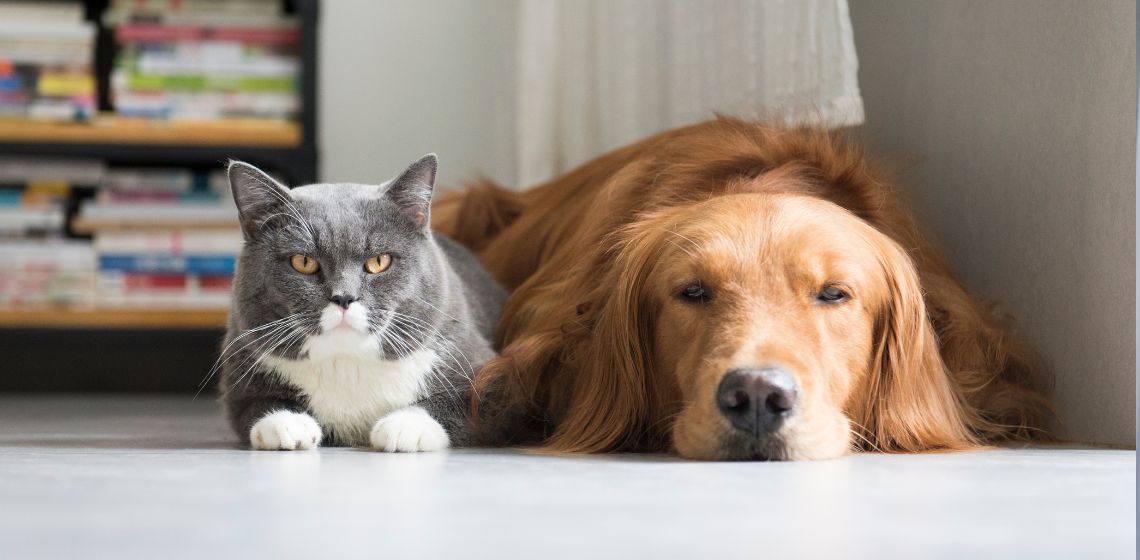Table of Contents
Signs of depression in dogs
- Changes in appetite: A depressed dog may lose interest in food, leading to weight loss. Conversely, some dogs might overeat as a form of comfort, resulting in weight gain.
- Lethargy: Depressed dogs often show a lack of energy and enthusiasm. They might sleep more than usual and display reduced interest in activities they once enjoyed, such as playing, walking, or socializing.
- Isolation: If your dog suddenly starts avoiding family members or other pets, it could be a sign of depression. They might prefer to stay in one spot, away from interaction.
- Changes in behavior: Uncharacteristic aggression or fearfulness can also be a sign of depression. Some dogs might become more irritable or anxious.
- Vocalization: Excessive whining, barking, or howling can indicate that your dog is feeling distressed or unhappy.
Signs of depression in cats
- Changes in appetite: Like dogs, depressed cats may either lose interest in their food or overeat. A noticeable change in eating habits can be a red flag.
- Lethargy: Cats suffering from depression often sleep more than usual and show little interest in playing or exploring.
- Hiding: Depressed cats may seek solitude and hide in unusual places. They might avoid interaction with their owners and other pets.
- Changes in grooming habits: Over-grooming or a lack of grooming can indicate stress or depression in cats. An unkempt appearance is a sign that your cat might not be feeling well.
- Vocalization: Increased or unusual vocalization, such as excessive meowing or crying, can be a symptom of depression.
Causes of depression in dogs and cats
- Loss or absence of a companion: The loss of a fellow pet or a family member can lead to feelings of loneliness and grief in dogs and cats.
- Changes in environment: Moving to a new home, changes in routine, or rearrangement of furniture can cause stress and anxiety, leading to depression.
- Lack of social interaction: Pets need social interaction to stay mentally healthy. A lack of attention from owners or isolation can contribute to depression.
- Medical conditions: Chronic pain or illness can cause discomfort and lead to depressive symptoms. Conditions like hypothyroidism in dogs or hyperthyroidism in cats can also affect mood.
- Neglect or abuse: Pets that have been neglected or abused may exhibit signs of depression due to trauma and lack of trust in humans.
- Seasonal changes: Just like humans, some pets can experience seasonal affective disorder (SAD) during darker, colder months. This can be due to decreased activity and stimulation or a decreased amount of sunlight disrupting our pet’s internal body clock.
Remedies for depression in dogs and cats
Increasing physical activity
- Regular exercise: Ensuring your dog gets plenty of exercise can help combat depression. Regular walks, playtime, and interactive toys can boost your dog’s mood.
- Playtime: Engaging in interactive play with your cat using toys like laser pointers, feather wands, or puzzle toys can stimulate their mind and body.
Enhancing social interaction
- Quality time: Spend more quality time with your pets. Cuddling, petting, and talking to them can provide comfort and reassurance.
- Socialization: Arrange playdates for dogs or consider introducing another pet as a companion. However, make sure your pet is open to social interactions before doing so.
Environmental enrichment
- Stimulating environment: Create a stimulating environment with new toys, scratching posts for cats, and interactive feeders. This can keep their minds engaged and reduce boredom.
- Routine: Maintain a consistent routine for feeding, play, and sleep. Predictability can help reduce anxiety in pets.
Professional Help
- Veterinary care: If you suspect your pet is depressed, consult a veterinarian to rule out any underlying medical conditions. Your vet can also recommend treatment options.
- Behavioral therapy: A professional pet behaviorist can work with your pet to address behavioral issues and provide strategies to improve their emotional well-being.
- Medication: In some cases, medication may be necessary. Antidepressants or anti-anxiety medications prescribed by a veterinarian can help manage severe cases of depression.
Preventive Measures
- Routine check-ups: Regular veterinary check-ups can help identify and address health issues early on, preventing potential causes of depression.
- Balanced diet: Ensure your pet receives a balanced diet to support overall health. Nutritional deficiencies can affect mood and energy levels. If you’re unsure of the best diet for your pet, your veterinarian will be happy to suggest the best food catered to your pet’s needs.
- Mental stimulation: Keep your pet mentally stimulated with new experiences, training sessions, and interactive toys. Mental engagement is crucial for their emotional health.
- Positive reinforcement: Use positive reinforcement techniques to build trust and encourage good behavior. This can help create a positive environment for your pet.
Depression in dogs and cats is a serious issue that requires attention and care from pet owners. By recognizing the signs and symptoms, understanding the potential causes, and implementing effective remedies, we can help our pets lead happier, healthier lives. Our pets rely on us for their well-being, and addressing their emotional health is just as important as tending to their physical needs. With love, patience, and the right approach, we can make a significant difference in the lives of our companions.

Emily is a veterinary technician with over 6 years of experience in the field. She knew since she was a child that she was meant to work with animals. She started her career working in veterinary ophthalmology and has since worked her way to general practice. Emily now works as a surgical technician working in the operating room. When not at work, Emily spends her time with her husband and her small zoo of 3 dogs, 4 cats, 5 ducks, and 5 chickens.








